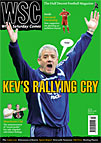 A France midfielder and amateur film director, sacked for “insubordination”. Andy Brassell looks at a player for whom the World Cup was the nadir not a peak
A France midfielder and amateur film director, sacked for “insubordination”. Andy Brassell looks at a player for whom the World Cup was the nadir not a peak
“I wouldn’t have liked to have left people indifferent about me.” As the former France midfielder Vikash Dhorasoo contemplated a football epitaph for himself having formally confirmed his retirement, at least one career objective had been comfortably fulfilled.
Though he made his announcement on January 11, 2008, Dhorasoo has been effectively out of the game since being sacked by Paris Saint-Germain in October 2006. He started this season in Serie A with Livorno, but struggled for fitness and never managed a game before having his contract cancelled in late October, following a dispute with the management. He decided to reject a December bid to sign him from ambitious Ligue 2 side Grenoble at the last moment, then called it a day.
Dhorasoo was a throwback to a bygone era, a diminutive but stylish and talented midfielder. He came through the academy at his local side Le Havre before moving to Lyon and enjoyed his most productive years there, despite being loaned to Bordeaux for a year in 2001 while persona non grata under Jacques Santini. He returned to be an important part of Paul Le Guen’s championship-winning sides of 2003 and 2004.
Reaching the end of his Lyon contract, Dhorasoo was adventurous enough to accept an offer from AC Milan. While never more than a squad player at the San Siro, the move to Italy put him back in the international picture – something Dhorasoo himself described as “paradoxical”. Having made his national debut against Ukraine in 1999, he was recalled to the France squad by coach Raymond Domenech in September 2004 after a five-year absence.
Dhorasoo headed to PSG in the summer of 2005 in search of more regular football and Paris was the scene of the last great triumph of his career. His superb goal proved to be the 2006 French Cup final winner against bitter rivals Marseille at the Stade de France. Coach Guy Lacombe hugged Dhorasoo at the final whistle, despite the fact that the latter “didn’t particularly want to be held in his arms”, he recently recounted.
Sadly, that summer’s World Cup proved to be a huge disappointment for him, due in part to the emergence of Franck Ribéry. It turned out that Dhorasoo’s main impact on the tournament (and the reason for his subsequent notoriety) was his participation in the film Substitute, a joint project with friend and director Fred Poulet. More Blair Witch than Goal!, the film was compiled from footage shot on hand-held 8mm by Dhorasoo and Poulet throughout the finals. Something that, with Dhorasoo’s intellectual leanings, promised to be somewhat esoteric became still more melancholy. His involvement amounted to a total of 16 minutes’ playing time, even if he did achieve the notable feat of becoming the first player of Indian descent to appear in the World Cup finals.
Dhorasoo’s unsuccessful struggle to keep his spirits up during the course of the film is a poignant counterpoint to the euphoria associated with a successful World Cup. He had played in all the qualifiers and the film shows a man feeling bewildered and cheated. “For two years, he [Domenech] trained me to climb a mountain. And the day I could climb it, he took the neighbour’s son.” Domenech didn’t too much care for the finished piece and demanded to be cut out of it, while Dhorasoo never played for France again. “I guess my astral sign didn’t fit with the national team,” he pithily remarked on French TV recently, referring to Domenech’s infamous and oft-lampooned obsession with astrology.
That autumn, the total breakdown of Dhorasoo’s relationship with Lacombe led to the former becoming the first player since the advent of the Professional Footballers’ Charter in 1973 to be fired by his club, his “lack of loyalty” and “insubordination” among other reasons listed in the official PSG statement. Captain Sylvain Armand recently admitted that the squad should have stuck up for their colleague, but that “it was too late” by the time they realised what had gone on. “That’s nice of him,” replied Dhorasoo, “but it would have been better if he had said something at the time.”
Dhorasoo is unlikely to go idle post-football. He plans to work with Bertrand Delanoë, the Socialist mayor of Paris, in the run-up to the municipal elections, and has a part in the next Pierre Jolivet film, La Très Très Grande Entreprise, playing a lawyer. He at least knows better than to expect a tribute match to commemorate his career. “I’d struggle to find enough players. Maybe Peguy Luyindula [his close friend from Lyon and PSG] would play up front,” he mused.
From WSC 253 March 2008